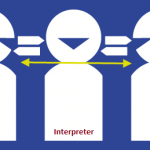The terms interpreter and translator are at times confused or used incorrectly. Understanding the difference is important. In some cases, you may need both.
Interpreter: A person who translates orally for people of different languages.
Translator: A person who turns the written word from one language to another language.
This blog will focus on the “interpreter.” Unless you have an excellent command of a particular language, an interpreter is your bridge to meaningful communication with an international client or partner. Highly trained professional interpreters translate orally for speakers of different languages, thus becoming the voice of the speaker, whether host or guest. This is extremely important when traveling and attending conventions and trade shows abroad. Never assume that English is the prevailing language!
Selecting Your Interpreter
First, decide what type of interpretation you need. There are three types of interpreting.
 Simultaneous interpreting: The interpreter translates as you speak. In large group situations, the interpreter sits in a soundproof booth, speaks into a microphone, while hearing the speaker via earphones. When more than one language is involved, several booths are utilized for relay interpretation.
Simultaneous interpreting: The interpreter translates as you speak. In large group situations, the interpreter sits in a soundproof booth, speaks into a microphone, while hearing the speaker via earphones. When more than one language is involved, several booths are utilized for relay interpretation.
Consecutive interpreting: The interpreter translates after you have spoken a sentence or paragraph before proceeding. When the speaker pauses or finishes speaking, the interpreter then delivers a portion or all of the message.(This can take extra time.) Can also be delivered remotely through teleconference.
Escort interpreting: The interpreter accompanies you in a country (or situation) where you do not speak the language and oftentimes serves as your guide. Service is performed in a variety of venues (e.g., business situations, travel, special occasions, tours, legal matters.) The interpretation can be also be delivered consecutively or simultaneously by utilizing special equipment.
Second, select an interpreter with strong credentials.
He or she should have experience in the type of interpreting you require, a personality appropriate for the occasion, and familiarity with the subject matter. In addition to bilingual skills, you may also require that an interpreter have bicultural skills (knowledge in both cultures), a matching level of professionalism, and country-specific knowledge. Plus, your interpreter should be familiar with the jargon used in your field.
Use the following as a guide:
- Bilingual or Bicultural
- Professionalism
- Personality Fit
- Knowledge of Subject Matter
- Country-Specific Knowledge
- Number of Interpreters
- Length of Time
If you need an interpreter for a lengthy period of time, you may be required to use more than one interpreter in order to provide sufficient break periods.
Be Prepared
Provide the following items to your interpreter in advance: your agenda, your speech or any other content to be presented, and an explanation of stories or humor (if used). For your part, test any needed equipment beforehand. Avoid distractions. Instruct others in the party to avoid shuffling papers or making noise and talking simultaneously. Allow for breaks, and brief your interpreter during breaks.
Interpreter’s Needs:
- Appropriate, functioning equipment
- Agenda in advance
- Advance copy of speech
- Advance notice of content and an explanation of stories or humor
Dos and Don’ts:
- Do give your interpreter materials in advance.
- Do give your interpreter regular breaks, and brief your interpreter during breaks.
- Do test any needed equipment beforehand.
- Don’t speak fast; instead, speak in sound bites (brief pauses between thoughts and/or sentences).
- Don’t shuffle papers or make noise during the exchange.
Tip: If you are having difficulty finding an interpreter or discover unexpectedly that you need an interpreter, seek out a student interpreter at a local university.
Positioning Protocol
 Once you have made these arrangements, your next consideration is how to interact socially. The challenge is to avoid speaking directly to the interpreter. The interpreter serves as a communication bridge, and should be unobtrusive; therefore, the interpreter should remain invisible to you as he or she relays the conversation. Be sensitive to the different cultural styles and roles of interpreters. Your eye contact should remain with the individual with whom you are communicating.
Once you have made these arrangements, your next consideration is how to interact socially. The challenge is to avoid speaking directly to the interpreter. The interpreter serves as a communication bridge, and should be unobtrusive; therefore, the interpreter should remain invisible to you as he or she relays the conversation. Be sensitive to the different cultural styles and roles of interpreters. Your eye contact should remain with the individual with whom you are communicating.
You have three choices for positioning:
- Seat the interpreter between and slightly behind the key parties.
- Seat the interpreter next to the guest (on the right side of the guest).
- Use an interpretation booth, if available and appropriate.
Note: In a dining situation, the interpreter often sits behind you and does not have a meal. They are given their meal either before their work begins or after they have concluded.
During the Interpretation Process
Ask everyone to speak in “sound bites” (a media term referring to speaking in short phrases that utilizes pauses). Your interpreter has to process two languages in his or head at the same time. Do not interrupt even if you feel the interpreter is taking longer than you feel is necessary. If the process is going to be long, and it is appropriate, allow for breaks. Interpreting is a mental task than can be fatiguing. All parties need time to refresh.
In general, be sensitive to different cultural styles and the roles of interpreters in those cultures. An experienced interpreter will pick up on cues (tone and body language), and will also be able to provide cultural cues.
Use simple language and avoid idioms, acronyms, metaphors (e.g., sport metaphors), and complex quotations. Realize that some words (or phrases) may not have a language translation. Say difficult words and names slowly and distinctly. Use visual aids wherever and whenever possible. This will help with clarity.
Ali-Asady Tips
First and foremost, realize that it is impossible for an interpreter to know every word in the English (or preferred) language; however, you can always ask the provider to “repeat, rephrase, or clarify.”
- Inform the parties that you will interpret everything that is said back and forth.
- When interpreting use “I” instead of he or she.
- When referring to the provider refer to them by their title (e.g., Mr., Mrs. Ms., Doctor, Judge, or by their first name. Always ask beforehand for their preference. (Do not “assume” first names are appropriate or preferred.)
- Even if you are an expert in the subject you are interpreting, do not give your opinion—you are just a voice.
Preparation and careful considerations will ensure that your interpreter serves as a communication bridge and that your interaction is a success.
Disability Note: Similar guidelines apply for situations that call for a sign interpreter for hearing-impaired participants. For more on accommodating various disabilities, read The Art of Professional Connections: Event Strategies for Successful Business Entertaining, Chapter 4, “Accommodating Guests with Disabilities,” by Jennifer Longdon, writer, speaker, and policy advocate on issues impacting people with disabilities.
Guest Contributor | Professional Interpreter
Ali Al-Asady
Member of the Global Interpreting Network
Freelance, Professional Arabic/English Interpreting Services
Home Smart, Realtor and Instructor
Eco Broker, Green, Sustainable Building Advisor
myaz.greenhome@gmail | www.phoenixgreenhomeconcepts.com
Want to learn more?
Reference Chapter 8, “Conferences, Conventions, and Trade Shows,” Section 2, “Arranging for Interpreters” in “The Art of Professional Connections: Event Strategies for Successful Business Entertaining.”
Ask about our Business Entertaining Seminars, Training Modules, and Books.







